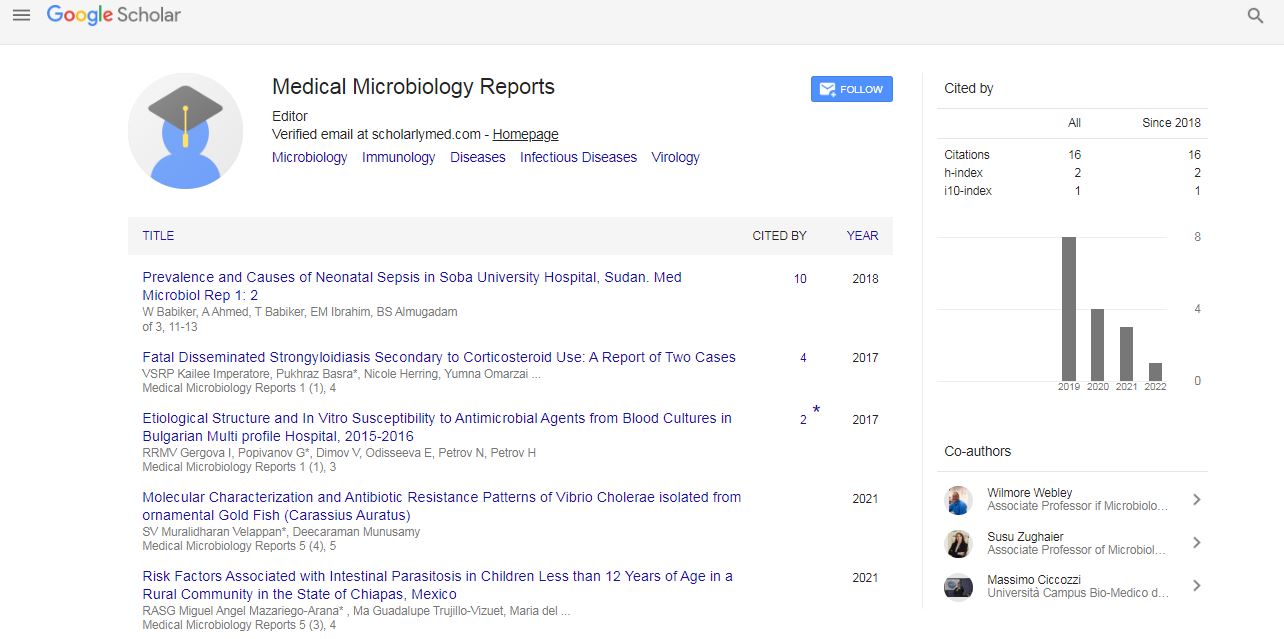DNA-minor groove as a molecular target for the design of highly-effective anti-tubercular agents
Federico Brucoli
De Montfort University, UK
: Med Microbiol Rep
Abstract
Statement of the Problem: Tuberculosis (TB) is one of the top ten killers worldwide and remains the leading cause of death among infectious diseases. There is still a limited number of validated TB targets and it is crucial to identify novel, or re-purpose existing, molecular targets to generate new anti-tubercular drugs to fight the tuberculosis pandemic. To this end, the well-characterised DNA-minor groove might be used to develop highly-effective anti-tubercular probes with a mechanism of action, i.e., DNA-binding, different from that of current TB drugs. DNA-minor groove binding agents can recognise discrete DNA sequence, modulate the activity of transcription factors and ultimately cause cell death. Methodology & Theoretical Orientation: Libraries of distamycin analogues and pyrrolobenzodiazepine(PBD)- C8-polyamide conjugates were synthesized and screened against slow-growing, pathogenic Mycobacterium tuberculosis H37Rv and Mycobacterium bovis BCG strains, and evaluated for DNA-binding activity using DNase I footprinting experiments. The compounds were also tested using the in vitro Wayne model of hypoxia-induced dormancy at pH 5.8 and 7.3 to reproduce environments of cellular and caseous granulomas. Findings: The PBDconjugates possessed significant anti-tubercular properties with minimum inhibitory concentration (MIC) values ranging from 0.04 – 5.19 μg/mL against M. tuberculosis and M. bovis, although showing some degree of cytotoxicity. H37Rv-active pyrrole(Py)-pyrrole(Py)-thiazole(Thz)-PBD (Fig.1) bound with high affinity to discrete sequences (6-8 nucleobases) of a DNA duplex and showed growth inhibitory activity at 5.1 μg/mL against hypoxic, non-replicating (NR) M. tuberculosis cultures and aerobic cells at pH 7.3. Conclusion & Significance: DNA-minor groove binding agents are remarkable chemical tools with significant antitubercular activity that represent promising leads against aerobic and NR, dormant M. tuberculosis.
Biography
Federico Brucoli has a degree in Pharmacy from the University of Palermo, Italy and a PhD in medicinal chemistry from UCL School of Pharmacy, London. His research interests focus on antibacterial and cancer chemotherapy, and the study of natural products as templates for future drug design. Emphasis is given to the synthesis and bioassay-guided evaluation of “small-molecule” anticancer/antibacterial compounds, which are designed to interact with an individual protein target or predetermined DNA sequence. Recent efforts have been directed towards the identification of new therapeutic drug leads to combat tuberculosis, a serious infectious disease caused by the slow-growing Mycobacterium tuberculosis bacterium. Dr Brucoli is hoping to make a significant contribution to the global fight against tuberculosis, which affects 10.5 million people worldwide and kills 1.4 million people every year, by developing novel anti-tubercular agents able to bind to discrete DNA regions and disrupt the bacterial transcription factor machinery.
E-mail: federico.brucoli@dmu.ac.uk
 Spanish
Spanish  Chinese
Chinese  Russian
Russian  German
German  French
French  Japanese
Japanese  Portuguese
Portuguese  Hindi
Hindi 
